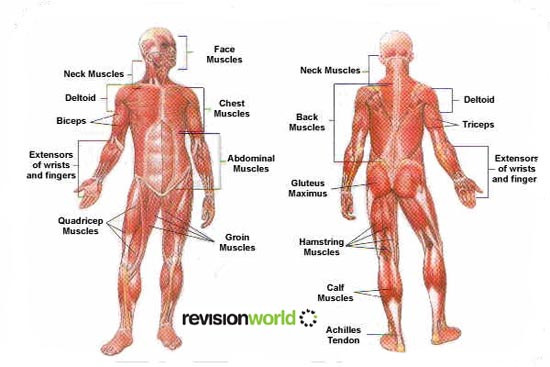After studying this section you should know
- Types of Muscle
- Muscle Fibres
- Muscle Contraction
There are 3 types of muscle:
1. Cardiac Muscle
- Only found in the heart
- Contract and relax continuously
- Work without conscious effort
2. Involuntary Muscle
- Around organs like the intestines
- Work without conscious effort
3. Voluntary Muscles
- Attached to the skeleton
- Under your control

Muscle Fibres
- Muscles are made up of fibres, which are either fast twitch or slow twitch.
- Everybody has a similar number of fibres, but different people have different proportions of fast twitch and slow twitch
- People who are fit and have larger muscles have fatter fibres, so more are ready to be used.
- Nerve impulses tell the muscle to contract when it needs to.
- Complex movements are made by the coordination of nerve impulses sent to the muscle by the nervous system.
- Fast twitch and slow twitch are good for different things.
Fast twitch fibres
- Contract very quickly and powerfully, but get tired quickly.
- Sprinters and shot-putters have lots of fast twitch fibres
Slow twitch fibres
- Contract more slowly and with less force, but don’t get tired so quickly.
- Long distance runners have more slow twitch fibres
Muscle Contraction
To make a joint move in two directions, you need two muscles that pull in the opposite direction.
Antagonistic muscles
- Pairs pairs of muscles that work against one another
- One muscle contracts (shortens) whilst the other relaxes (lengthens)
- The muscle that is doing the work (contracting) is the agonist
- The relaxing muscle is the antagonist
Synergists muscles -These hold the stationary bone still, so only one bone moves e.g. when the bicep contracts to bend the elbow, synergists stop the shoulder moving.
Isometric Contraction - The muscle stays the same length, so nothing moves
Isotonic Contraction - The muscle changes length, so moves
Muscle Fatigue – if you use your muscles a lot and they don’t get enough oxygen, they feel tired or fatigued
Muscle Atrophy – if you don’t use your muscles, they become smaller
Cramp – a sudden contraction of a muscle that won’t relax
Muscles never fully relax, they always have some tension in them. This is called muscle tone, which is improved by regular exercise.
